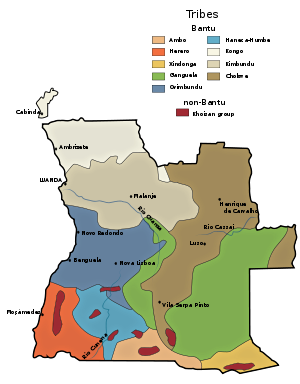Demographics of Angola
[1] Ethnically, there are three main groups, each speaking a Bantu language: the Ovimbundu who represent 37% of the population, the Ambundu with 25%, and the Bakongo 11%.In addition, mixed race (European and African) people amount to about 7%, with nearly 1% of the population being whites, mainly ethnically Portuguese.[3][4][5][6] Besides the Portuguese, significant numbers of people from other European and from diverse Latin American countries (especially Brazil) can be found.Once this was over, a massive development cooperation in the field of health and education brought in numerous civil personnel from Cuba.Roughly 26% are followers of traditional forms of Protestantism (Congregationals, Methodists, Baptista, Lutherans, Reformed), but over the last decades there has in addition been a growth of Pentecostal communities and African Initiated Churches.The website Our World in Data prepared the following estimates based on statistics from the Population Department of the United Nations.



AngolaAngolanDemographicpopulationpopulation densityethnicityBantu languageOvimbunduAmbunduBakongoChokweGanguelaNyanekaOvamboHereroXindongaPortugueseformer overseas territory of PortugalAngolan Civil WarCatholicismProtestantismAfrican Initiated ChurchesJehovah's WitnessesAfrican traditional religionsOur World in DataUnited NationsTotal fertility rateInfant mortalityLife expectancyEthnic groups in Angolamestiçowhite AfricansRomani peopleLanguages of AngolaKikongoKimbunduUmbunduTuchokweUkanyamaReligion in AngolaCatholicProtestantPentecostalMuslimsWayback MachineJornal de NotíciasThe World FactbookCentral Intelligence Agencypublic domainpublic domain materialUnited States Department of StateBrazilianǃKungLovaleMbundaMucubalWhite AngolansGermanNorwegianAfrikanerDemographics of Africa AlgeriaBotswanaBurkina FasoBurundiCameroonCape VerdeCentral African RepublicComorosDemocratic Republic of the CongoRepublic of the CongoDjiboutiEquatorial GuineaEritreaEswatiniEthiopiaThe GambiaGuineaGuinea-BissauIvory CoastLesothoLiberiaMadagascarMalawiMauritaniaMauritiusMoroccoMozambiqueNamibiaNigeriaRwandaSão Tomé and PríncipeSenegalSeychellesSierra LeoneSomaliaSouth AfricaSouth SudanTanzaniaTunisiaUgandaZambiaZimbabweSahrawi Arab Democratic RepublicSomalilandCanary IslandsMadeiraMayotteRéunionSaint HelenaAscension IslandTristan da CunhaWestern SaharaarticlesHistoryPrecolonial historyArchaeologyColonial historyPortuguese ruleColonial governorsWar of IndependencePeople's RepublicCivil WarConflictsGeographyCities and towns